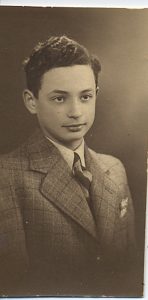Tribute to Paul Schaffer, who passed away on 6 August 2020
 Portrait of Paul Schaffer, 1930s-1940s, without place.
Portrait of Paul Schaffer, 1930s-1940s, without place.
Credits: Shoah Memorial
Paul Schaffer
died this day at the age of 95. Deported at the age of 16 and survivor of convoy 28, Paul Schaffer, worked all his life for the transmission of the memory of the Shoah. At the Memorial, to which he was very attached, he often came to participate in conferences or ceremonies. He also came there to testify, especially in front of school students.
It was also at the request of the students to whom he was testifying that Paul Schaffer decided to tell his story in a deeply moving and authentic book entitled Le soleil voilé (published by the Société des Ecrivains, 2003).
Officer of the Legion of Honor, honorary citizen of the town of Revel in Haute-Garonne, honorary president of the French Committee for Yad Vashem, Paul Schaffer was also a member of the board of the Foundation for the Memory of the Shoah. The Shoah Memorial salutes the memory of Paul Schaffer and offers its condolences to his family and friends.
Born and raised in Vienna, Paul Schaffer lived a happy childhood, surrounded by his sister, his parents and his grandmother. His life changes brutally with the occupation of Vienna by the Nazis and the annexation of Austria. He discovers humiliations, persecutions and goes into exile for the first time with his family in Belgium.
In May 1940, the Germans attacked France through Belgium and Holland. The Schaffer family decides to leave Brussels and goes to Revel, a village in the southwest of France, not far from Toulouse. Life is gradually organizing itself: Paul, who no longer goes to school, takes care of gardening, performs various household tasks and learns the trade of cabinetmaker.
At the end of 1940, the Schaffers were "invited" to join "a family camp", the internment camp in Agde, mainly composed of Jewish refugees from Germany and Austria. A family friend, resident of Revel, uses her influence with the prefecture, thus allowing the family to leave the camp to be assigned under house arrest. The Schaffers, poorly informed, do not seek to leave France and do not suspect the fate that awaits them.
Following the Vel’ d'Hiv' roundup, the Germans put pressure on Laval, then at the head of the Vichy government, to have foreign Jews from the southern zone added to the list of deportations. This is how Paul was arrested on August 26, 1942. On the walls of the camp at Drancy, where there are some days left, he notices several inscriptions engraved by deportees who will mark him forever: "When there is nothing to hope for, that’s when you must not despair" and another tragic assertion «we enter, we shout and it’s life; we scream, we leave and it’s death».
On September 4, 1942, by convoy 28, Paul was deported to Auschwitz with his mother and sister who were gassed upon their arrival. He escapes this fate: he is interned in two forced labor camps, satellites of Auschwitz: Tarnovitz, then Schoppinitz, before joining Birkenau in November 1943.
At the end of an unbearable six-month stay, Paul is transferred to the site of Bobrek, where the company Siemens, taking advantage of cheap labor, has a factory built by deportees. The conditions there are much less painful than in Birkenau. At Bobrek, Paul meets Simone Veil (Jacob), his sister and his mother. They will meet again after the war in Paris and form unbreakable friendships.
In January 1945, the "death march" took him to the camp of Discowitz. He is then transported to the west in an open car, but manages to jump off the train with a friend and joins after a few days the German-Soviet front. While waiting to be repatriated to France by the French army, Paul and his friend will stay in Krakow until April 1945, happy to be free again.
Once in France, Paul returns to Revel, place of his arrest. He learns the death of his father and discovers what happened during the war. After two months, he leaves Revel for Toulouse where he begins to work. He obtains a scholarship and resumes his studies in 1945. Initially an electronics engineer, he then embarked on a brilliant career as an industrialist, after having been a teacher in a Jewish school of the ORT (Organisation, Reconstruction, Work).
Testimony of Paul Schaffer within the auditorium of the Shoah Memorial, in November 2018:

